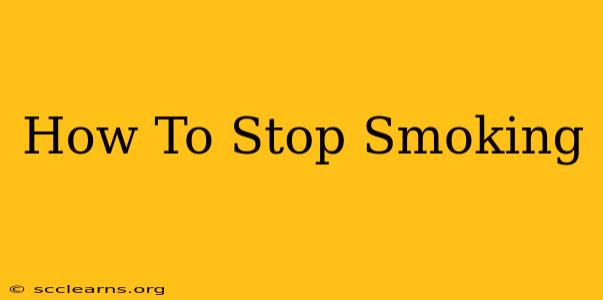Smoking is a harmful habit that significantly impacts your health and well-being. Quitting is challenging, but it's one of the best things you can do for your health. This guide provides practical steps and strategies to help you successfully quit smoking and enjoy a healthier, smoke-free life.
Understand Your Smoking Habits
Before you begin your quit journey, take some time to understand your smoking patterns. This self-awareness is crucial for developing an effective quit plan.
Identify Your Triggers:
What situations or emotions cause you to crave a cigarette? Common triggers include stress, anxiety, boredom, social gatherings, or even specific locations. Keeping a journal to track your smoking habits – when, where, why, and how much you smoke – can help you identify these triggers.
Assess Your Nicotine Dependence:
Understanding your level of nicotine dependence helps determine the best cessation methods for you. The more you smoke, the stronger your dependence and the more challenging quitting will be.
Choosing Your Quitting Method
Several methods can aid in smoking cessation. The most effective approach is often a combination of strategies.
Nicotine Replacement Therapy (NRT):
NRT products like patches, gum, lozenges, inhalers, and nasal sprays provide controlled doses of nicotine to reduce cravings and withdrawal symptoms. These help to wean you off nicotine gradually.
Prescription Medications:
Your doctor may prescribe medications like bupropion (Zyban) or varenicline (Chantix) to help manage cravings and withdrawal symptoms. These medications can significantly improve your chances of success.
Counseling and Support Groups:
Behavioral therapy, individual counseling, and support groups provide valuable guidance and coping mechanisms to manage cravings and triggers. Sharing experiences with others facing similar challenges offers crucial emotional support.
Hypnotherapy:
Some people find hypnotherapy helpful in addressing the psychological aspects of addiction, helping to change ingrained behaviors and cravings.
Developing Your Quit Plan
A well-structured quit plan is crucial for success. Consider the following steps:
Set a Quit Date:
Choosing a specific date empowers you and allows you to prepare mentally and practically.
Tell Your Support System:
Inform family and friends about your decision and enlist their support. Having a strong support network is invaluable during the quitting process.
Remove Smoking Triggers:
Get rid of all cigarettes, ashtrays, and other smoking paraphernalia from your home and car. Avoid places and situations that trigger your cravings.
Develop Coping Mechanisms:
Prepare strategies to deal with cravings and triggers. Engage in activities that distract you, such as exercise, hobbies, or spending time with loved ones.
Plan for Setbacks:
Understand that setbacks are normal. Don't let occasional slips derail your progress. Learn from them and recommit to your quit plan.
Maintaining a Smoke-Free Lifestyle
Quitting smoking is a journey, not a destination. Sustaining a smoke-free life requires ongoing effort and self-care.
Stay Active:
Regular physical activity helps manage stress and reduce cravings.
Eat a Healthy Diet:
Nourishing your body with healthy foods provides energy and reduces the risk of weight gain, a common concern for ex-smokers.
Manage Stress:
Develop healthy coping mechanisms for stress, such as meditation, yoga, or spending time in nature.
Seek Support When Needed:
Don't hesitate to reach out to your support network, therapist, or support group for help when needed. Remember, you are not alone.
Quitting smoking is a significant achievement that dramatically improves your health and quality of life. By understanding your habits, choosing the right methods, developing a strong quit plan, and maintaining a healthy lifestyle, you can successfully quit smoking and embark on a healthier, smoke-free future. Remember to celebrate your progress along the way. You've got this!

